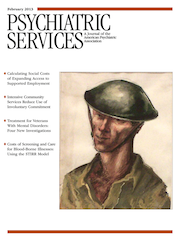Public-Academic Partnerships: A Rapid Small-Grant Program for Policy-Relevant Research: Motivating Public-Academic Partnerships
Abstract
To help grow a cadre of researchers with the knowledge and skills to pursue topics of great utility to public mental health systems, the director of the Division of Mental Health Services and Policy Research at Columbia University used funding from the New York State Office of Mental Health (OMH) to create a rapid small-grant program called the OMH Policy Scholars Program. This column uses two case examples to describe how this public-academic partnership exposes early-career researchers to the needs and complexities of large public mental health systems while providing them with senior research and policy mentors to help ensure the success of the scholars’ projects and oversee their introduction to and work within the public mental health system. This type of collaboration is one model of encouraging early-career psychiatric researchers to pursue policy-relevant research.



